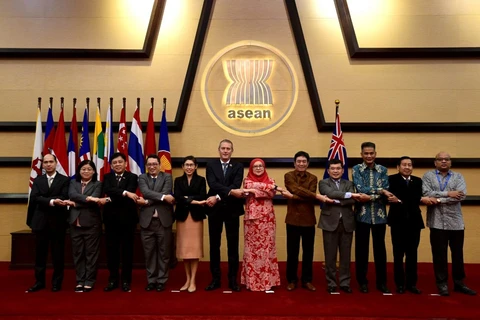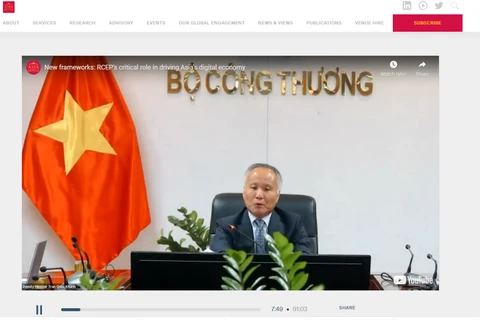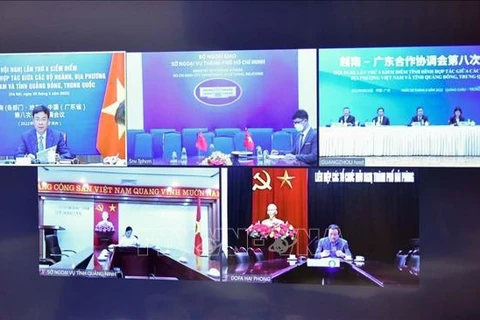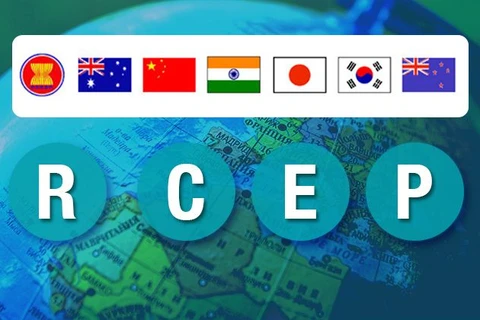Hanoi (VNA) – The Ministries of Industry and Trade and of Agriculture and Rural Development held a hybrid conference on July 13 to launch the implementation plan of the Regional Comprehensive Economic Partnership (RCEP) in a bid to show domestic enterprises how to tap opportunities brought about by the pact.
RCEP is a mega trade deal signed by 10 ASEAN members and five partner countries – Japan, the Republic of Korea, China, Australia and New Zealand – on November 15, 2020 and officially took effect on January 1, 2022.
Once fully implemented, the agreement will form the world's largest free trade area with 2.2 billion consumers, accounting for about a third of the world's population and global GDP. Strong commitments on market opening in the fields of goods, services and investment, especially the application of a common rule of origin for the 15 signatories to create favorable conditions for the formation and development of new supply chains in the region.
Speaking at the conference, Minister of Industry and Trade Nguyen Hong Dien highlighted the importance of such conditions, saying it will facilitate Vietnamese businesses and industries to diversify and optimise input materials to improve productivity, quality and competitiveness, trade, and exports, making positive contributions to the country's socio-economic growth.
 Minister of Industry and Trade Nguyen Hong Dien speaks at the event. (Photo: Ministry of Industry and Trade) Dang Phuc Nguyen, General Secretary of the Vietnam Fruit Association, said fruit and vegetable products, when exported or imported between RCEP member countries, must have quotas or be approved by a pre-signed protocol.
Minister of Industry and Trade Nguyen Hong Dien speaks at the event. (Photo: Ministry of Industry and Trade) Dang Phuc Nguyen, General Secretary of the Vietnam Fruit Association, said fruit and vegetable products, when exported or imported between RCEP member countries, must have quotas or be approved by a pre-signed protocol.
Tran Thi Lan Anh, General Secretary of Vietnam Chamber of Commerce and Industry (VCCI), said for Vietnamese enterprises, the deal has a greater impact because RCEP partners are the source of about 70% of imports and the output market of nearly 40% of Vietnam's exports.
Therefore, the agreement is expected to open up integration opportunities for them, she said, adding that it also poses significant competitive challenges.
She recommended Vietnamese enterprises improve their competitiveness and actively study RCEP’s commitments to capitalise on related opportunities and tackle any challenges./.
RCEP is a mega trade deal signed by 10 ASEAN members and five partner countries – Japan, the Republic of Korea, China, Australia and New Zealand – on November 15, 2020 and officially took effect on January 1, 2022.
Once fully implemented, the agreement will form the world's largest free trade area with 2.2 billion consumers, accounting for about a third of the world's population and global GDP. Strong commitments on market opening in the fields of goods, services and investment, especially the application of a common rule of origin for the 15 signatories to create favorable conditions for the formation and development of new supply chains in the region.
Speaking at the conference, Minister of Industry and Trade Nguyen Hong Dien highlighted the importance of such conditions, saying it will facilitate Vietnamese businesses and industries to diversify and optimise input materials to improve productivity, quality and competitiveness, trade, and exports, making positive contributions to the country's socio-economic growth.
 Minister of Industry and Trade Nguyen Hong Dien speaks at the event. (Photo: Ministry of Industry and Trade)
Minister of Industry and Trade Nguyen Hong Dien speaks at the event. (Photo: Ministry of Industry and Trade) Tran Thi Lan Anh, General Secretary of Vietnam Chamber of Commerce and Industry (VCCI), said for Vietnamese enterprises, the deal has a greater impact because RCEP partners are the source of about 70% of imports and the output market of nearly 40% of Vietnam's exports.
Therefore, the agreement is expected to open up integration opportunities for them, she said, adding that it also poses significant competitive challenges.
She recommended Vietnamese enterprises improve their competitiveness and actively study RCEP’s commitments to capitalise on related opportunities and tackle any challenges./.
VNA
























